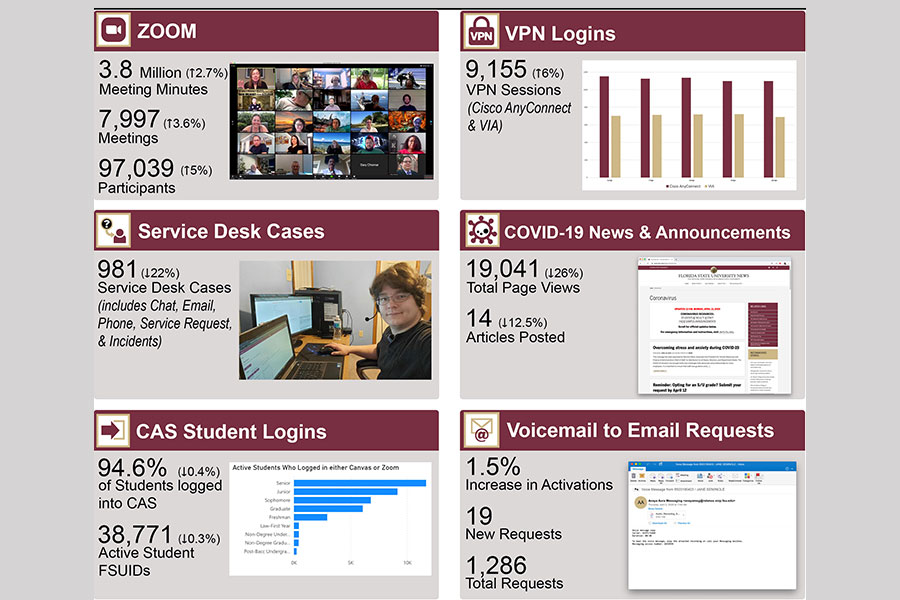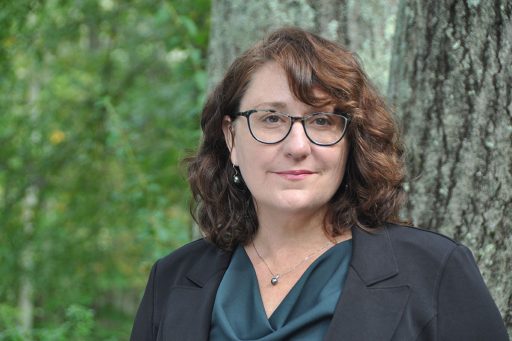
When Florida State University students, faculty and staff shifted to remote work last month amid a global pandemic, Information Technology Services staff saw their workload spike.
Licensing agreements needed to be expanded and updated. Hardware and software had to be distributed. Faculty and staff required training and coaching in how to navigate their new remote setups. Security had to be considered every step of the way.
With the announcement last week that the university’s remote-only status will continue through the end of July, this uptick in activity figures to be the new reality for FSU’s ITS staff for at least the next few months.

FSU Chief Information Officer and Associate Vice President Jane Livingston said the demands of current circumstances are undoubtedly unique, but FSU’s team was prepared.
“ITS staff are used to responding to urgent situations and we’ve had plenty of practice with hurricanes,” she said. “This crisis is different because it was a long sprint at the beginning, and it is now turning into a marathon. I am tremendously proud of how all the IT teams across campus have pulled together.”
FSU’s expanded remote infrastructure supports daily access for thousands of people around the globe that, in the week ending April 10, included 7,714 meetings, totaling 3.1 million minutes and 92,320 total participants.
Virtual private networks (VPNs) are the backbone of this remote effort, helping to support 9,155 logins alone in the same time frame.
Livingston explained the vital role of VPNs.
“A university network is like a medieval city with the wall around it,” she said. “In going remote, we’ve sent all the villagers out into the woods. So, what the VPN allows is a little bubble to enclose those people in the woods and protect them like they’re still behind the city wall.”
In FSU’s case, the villagers can be found in all 50 states and places as far flung as Rajshahi, Bangladesh, and Canterbury, New Zealand. From as far north as Oulu, Finland, to as far south as Hobart, in the Australian state of Tasmania, students and staff are logging into FSU’s network from every continent on the planet, except Antarctica.
As they do, Livingston said, the recent spate of “Zoom Bombing” that has hit campuses across the country illustrates that security must remain a top priority, along with access.
While crediting ITS staff across campus, Livingston said that expanding secure access by VPN is one of the most impressive achievements she’s observed since COVID-19 forced the transition.
“Standing up additional VPNs, testing them and getting them up and running is usually work that involves multiple teams — a network team, an infrastructure team, a team building servers and then people in desktop support,” she said. “It can take months. We had ours in a couple weeks.”
“Standing up additional VPNs, testing them and getting them up and running is usually work that involves multiple teams — a network team, an infrastructure team, a team building servers and then people in desktop support. It can take months. We had ours in a couple weeks.”
— Jane Livingston
With so many resources being shifted online, call center support is especially important. Livingston said getting the 100-person call-center team up and running remotely was its own feat that required the adoption of new software to enable staff to answer calls as if they were still at their desks.
“We installed that software last month and rolled it out and that’s how people are answering phones,” she said. “So far it’s working really well. I think the numbers speak for themselves.”
Those numbers include an average of more than 1,100 separate phone calls, chats and emails for incidents and service requests per week.
Among the teams on campus that Livingston works closely with is the Office of Distance Learning, where Director Robbie Fuselier said his office is buzzing. Fuselier’s team is tackling a spectrum of issues — from entry–level hurdles like introducing users to new software to more granular decisions like the best methods to administer tests remotely.
“The big focus we’ve been promoting most recently is helping instructors find alternative means to evaluate their students,” he said. “Instead of having a big final exam, students might have final projects or more complicated take-home exams. There are a lot of options out there that we’re working with faculty on.”
Fuselier said his team’s focus is now pivoting toward preparing for the summer academic sessions and helping colleges determine which courses can and should be offered.
As the day-to-day work supporting this new arrangement unfolds, Fuselier said he’s been impressed by how faculty and staff are finding ways to innovate and adapt.
“For example, in one engineering class where the students needed to communicate complex formulas — that can be tough to do online,” he said. “That instructor used an app on your phone that will convert the pictures to PDFs so his class can turn in pictures of written work.”
Fuselier added, “It’s a lot of little things like that that we haven’t encountered where people are finding problems and then sharing their solutions.”




